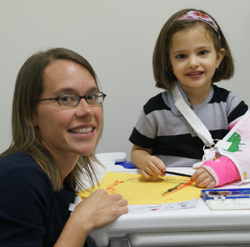 |
MMI speech therapist Korey Stading and 4-year-old Hope Kircher painted with watercolors at a recent individual speech therapy appointment. Individual speech therapy and the preschool speech and language clinics are funded by the Nebraska Scottish Rite Masons, who will host a fundraiser this Saturday, Oct. 11. |
Born with apraxia, a motor planning speech disorder that affects coordination of the tongue and lips, Hope had trouble talking. She knew what she wanted to say, but couldn’t get the words out, hence the sound effects, gestures and facial expressions she used to communicate.
“We could understand what she was saying, but not everybody else could,” said her mother, Patty Kircher of Omaha.
But Kircher wanted her youngest daughter to be able to communicate with her peers and others about her imaginary friends and how much she loves princesses.
|
“When she first came, we worked on just getting her to use basic consonant and vowel sounds,” said Korey Stading, a speech therapist at MMI. “Apraxia makes it difficult to produce speech sounds and words are a combination of speech sounds, which makes them even more difficult.”
At a recent individual speech therapy appointment, 4-year-old Hope or “Hopey” as she refers to herself, painted a birthday cake as she talked about colors, including yellow.
“That word was so hard for her,” Kircher said. “For the longest time she used to say ‘rello.’
“Hope has just made tons of progress since she started coming here. This time last year, she couldn’t string two words together.”
Thanks to the therapy sessions funded by the Nebraska Scottish Rite Masons, Hope has gone from using pictures to communicate, to saying vocabulary words to speaking in three- to five-word sentences and having conversations.
She can now tell Stading all about her “boo boo” — a broken arm — her trip to Washington to see “Bushy” and that she wants to “go to Spain.” She currently is working on sequencing her speech to make it sound more natural through repetition.
“The best part about her therapy is that I can watch it from the observation room and learn what I can do at home to help,” Kircher said.
Hope’s 11-year-old brother and 13-year-old sister also help with their sister’s speech by role playing, modeling and praising her for “good talking.”
Stories like Hope’s are an inspiration to Curt Edic, General Secretary of the Omaha Valley Scottish Rite Masons, and the reason the chapter continues to support the Rite Care clinics.
“For every dollar we spend, it saves three to five dollars in special education costs,” Edic said. “With funds from this year’s fundraiser (see sidebar), we plan to continue offering a scholarship to a University of Nebraska at Omaha speech pathology student and decrease the waiting list of the Rite Care clinics with the help of a new clinician.”
That way more children like Hope can attend the preschool and receive individual speech therapy, so they can learn to communicate in ways others understand.
“Since Hope has been coming to speech therapy at MMI, we’ve been out with people who don’t see her on a regular basis and they say ‘I can really understand her words!'” Kircher said. “That’s been huge.”